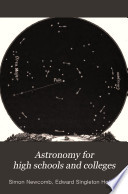 that every particle of matter in the universe attracts every other particle, with a force whose direction is that of the line joining the two, and whose magnitude is directly as the product of their masses, and inversely as the square of their distances... that every particle of matter in the universe attracts every other particle, with a force whose direction is that of the line joining the two, and whose magnitude is directly as the product of their masses, and inversely as the square of their distances...  A Popular History of Science - Page 193by Robert Routledge - 1881 - 673 pagesFull view A Popular History of Science - Page 193by Robert Routledge - 1881 - 673 pagesFull view - About this book
 | Thomas Harper - 1881 - 798 pages
...of the kind of Judgments here alluded to. Take, for instance, the law of universal gravitation, — that every particle of matter in the universe attracts every other particle with a force directly proportioned to the mass of the attracting particle, and inversely to the square of the distance... | |
 | Albert Taylor Bledsoe, Sophia M'Ilvaine Bledsoe Herrick - 1869 - 534 pages
...transparent medium of the Philosophia? Naturalls Principia Mathematica. The law of universal gravitation, that 'every particle of matter in the universe attracts every other particle, with a force directly proportioned to its mass, and inversely to the square of its distance from the particle attracted,'... | |
 | Thomas Harper - 1881 - 798 pages
...of the kind of Judgments here alluded to. Take, for instance, the law of universal gravitation, — that every particle of matter in the universe attracts every other particle with a force directly proportioned to the massoflAe attracting particle, and inversely to the square of the distance... | |
 | Simon Newcomb, Edward Singleton Holden - 1879 - 534 pages
...NEWTON was able to formulate his great law of universal gravitation iu these comprehensive words : " Every particle of matter in the universe attracts every other particle with a force directly as the masses of the two particles, and inversely as the square of the distance which separates... | |
 | Edward John C. Morton - 1880 - 58 pages
...satisfies the facts. | V. — Of the verification of the Law of Gravitation. 1. The Law of Gravitation. Every particle of matter in the Universe attracts every other particle with a force varying directly as the product of their masses, and inversely as the square of the distance between... | |
 | John McGovern - 1880 - 762 pages
...Astronomer, who immediately recognized and promulgated the law of Universal Gravitation, as follows : " Every particle of matter in the Universe attracts every other particle with a force proportional to the quantity of matter contained in each, and decreasing inversely as the squares of... | |
 | Simon Newcomb, Edward Singleton Holden - 1880 - 542 pages
...NEWTON was able to formulate his great law of universal gravitation in these comprehensive words : ' ' Every particle of matter in the universe attracts every other particle with a force directly as the masses of the two particles, and inversely as the square of the distance which separates... | |
 | George Minchin Minchin - 1880 - 568 pages
...POTENTIAL. SECTION I. Solid Distributions of Matter in General. 241.] Universal Law of Attraction. Every particle of matter in the universe attracts every other particle with a force whose direction is that of the line joining the two particles, and whose magnitude is directly proportional... | |
 | Simon Newcomb, Edward Singleton Holden - 1881 - 544 pages
...NEWTON was able to formulate his great law of universal gravitation in these comprehensive words : " Every particle of matter in the universe attracts every other particle with a force directly as the masses of the two particles, and inversely as the square of the distance which separates... | |
 | John Michels (Journalist) - 1881 - 462 pages
...same name, and my first paper was a protest against that. Newton's law of Universal Gravitation states that "every particle of matter in the Universe attracts every other particle of matter," and until it is discovered that ether possesses this property of attraction, I hold that... | |
| |